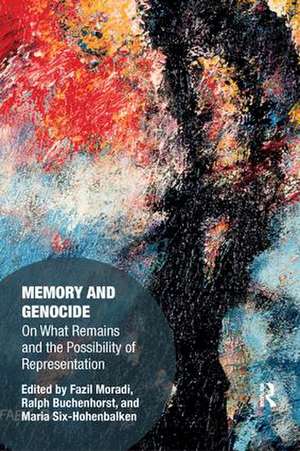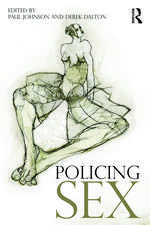Memory and Genocide: On What Remains and the Possibility of Representation: Memory Studies: Global Constellations
Editat de Fazil Moradi, Ralph Buchenhorst, Maria Six-Hohenbalkenen Limba Engleză Paperback – 18 oct 2018
| Toate formatele și edițiile | Preț | Express |
|---|---|---|
| Paperback (1) | 297.79 lei 6-8 săpt. | |
| Taylor & Francis – 18 oct 2018 | 297.79 lei 6-8 săpt. | |
| Hardback (1) | 764.20 lei 6-8 săpt. | |
| Taylor & Francis – 6 apr 2017 | 764.20 lei 6-8 săpt. |
Din seria Memory Studies: Global Constellations
-
 Preț: 326.49 lei
Preț: 326.49 lei -
 Preț: 318.01 lei
Preț: 318.01 lei - 9%
 Preț: 1004.85 lei
Preț: 1004.85 lei -
 Preț: 288.30 lei
Preț: 288.30 lei -
 Preț: 362.57 lei
Preț: 362.57 lei - 18%
 Preț: 1003.43 lei
Preț: 1003.43 lei - 18%
 Preț: 1001.55 lei
Preț: 1001.55 lei -
 Preț: 389.38 lei
Preț: 389.38 lei - 14%
 Preț: 311.03 lei
Preț: 311.03 lei -
 Preț: 389.11 lei
Preț: 389.11 lei - 18%
 Preț: 892.61 lei
Preț: 892.61 lei -
 Preț: 387.65 lei
Preț: 387.65 lei -
 Preț: 410.16 lei
Preț: 410.16 lei -
 Preț: 326.49 lei
Preț: 326.49 lei - 19%
 Preț: 257.25 lei
Preț: 257.25 lei -
 Preț: 385.54 lei
Preț: 385.54 lei - 18%
 Preț: 997.14 lei
Preț: 997.14 lei - 18%
 Preț: 1004.72 lei
Preț: 1004.72 lei -
 Preț: 389.38 lei
Preț: 389.38 lei - 16%
 Preț: 273.05 lei
Preț: 273.05 lei -
 Preț: 423.30 lei
Preț: 423.30 lei - 18%
 Preț: 895.32 lei
Preț: 895.32 lei - 19%
 Preț: 257.68 lei
Preț: 257.68 lei - 15%
 Preț: 296.95 lei
Preț: 296.95 lei -
 Preț: 317.29 lei
Preț: 317.29 lei - 18%
 Preț: 1001.51 lei
Preț: 1001.51 lei - 18%
 Preț: 919.43 lei
Preț: 919.43 lei -
 Preț: 389.38 lei
Preț: 389.38 lei - 18%
 Preț: 1001.87 lei
Preț: 1001.87 lei
Preț: 297.79 lei
Preț vechi: 348.23 lei
-14% Nou
Puncte Express: 447
Preț estimativ în valută:
56.98€ • 60.93$ • 47.51£
56.98€ • 60.93$ • 47.51£
Carte tipărită la comandă
Livrare economică 17 aprilie-01 mai
Preluare comenzi: 021 569.72.76
Specificații
ISBN-13: 9780367085360
ISBN-10: 0367085364
Pagini: 198
Ilustrații: 4
Dimensiuni: 156 x 234 x 12 mm
Greutate: 0.37 kg
Ediția:1
Editura: Taylor & Francis
Colecția Routledge
Seria Memory Studies: Global Constellations
Locul publicării:Oxford, United Kingdom
ISBN-10: 0367085364
Pagini: 198
Ilustrații: 4
Dimensiuni: 156 x 234 x 12 mm
Greutate: 0.37 kg
Ediția:1
Editura: Taylor & Francis
Colecția Routledge
Seria Memory Studies: Global Constellations
Locul publicării:Oxford, United Kingdom
Cuprins
List of Figures
Acknowledgements
Notes on Contributors
Preface, by Günther Schlee
Introduction: The Past in Translation
Fazil Moradi, Maria Six-Hohenbalken, Ralph Buchenhorst
Alexander Laban Hinton
Index
Acknowledgements
Notes on Contributors
Preface, by Günther Schlee
Introduction: The Past in Translation
Fazil Moradi, Maria Six-Hohenbalken, Ralph Buchenhorst
- Intimate Interrogations: The Literary Grammar of Communal ViolenceChristi Merill
- Oral Performers and Memory of Mass Violence: Dynamics of Collective and Individual RememberingLaury Ocen
- Parallel Readings: Narratives of ViolenceÉva Kovács
- Genocide in Translation: On Memory, Remembrance, and Politics of the FutureFazil Moradi
- Remembering the Poison Gas Attack on Halabja: Questions of Representations in the Emergence of Memory on GenocideMaria Six-Hohenbalken
- Afterlives of Genocide: Return of Human Bodies from Berlin to Windhoek, 2011Memory Biwa
- Communicating the Unthinkable: A Psychodynamic PerspectiveIvana Maček
- Between Nakba, Shoah and Apartheid: Notes on a Film from the IntersticesHeidi Grunebaum
- The Rethinking of Remembering: Who Lays Claim to Speech in the Wake of Catastrophe?Rachmi Diyah Larasati
- Field, Forum, and Vilified Art: Recent Developments in the Representation of Mass Violence and its RemembranceRalph Buchenhorst
Alexander Laban Hinton
Index
Recenzii
'When the survivors of genocide have passed away, their testimonies have aged, and guilty camps have turned into museums, then this superb collection will help us understand the unending attempts to remember and represent the horrendous violence in performances, narratives, and art works.' - Antonius C. G. M. Robben, Utrecht University, Netherlands, author of Political Violence and Trauma in Argentina
‘This remarkable collection engages with the challenging problem of how human beings cope with genocidal violence, through narratives, performances, visual representations and other modes of translation and remembrance. These richly contextualized case studies go a long way towards reminding us that extreme violence can be an occasion for socially productive forms of narration and recollection which resist the utter despair and speechlessness that accompany genocide.’ - Arjun Appadurai, New York University, USA
‘This remarkable collection engages with the challenging problem of how human beings cope with genocidal violence, through narratives, performances, visual representations and other modes of translation and remembrance. These richly contextualized case studies go a long way towards reminding us that extreme violence can be an occasion for socially productive forms of narration and recollection which resist the utter despair and speechlessness that accompany genocide.’ - Arjun Appadurai, New York University, USA
Descriere
This book focusses on the ethical, the aesthetic and scholarly dimensions of how genocide-related works of art, documentary and feature films, literary works, museums, music, and law translate and are translated as representative of real acts of genocide – as mediating processes materialized in the aftermath.













